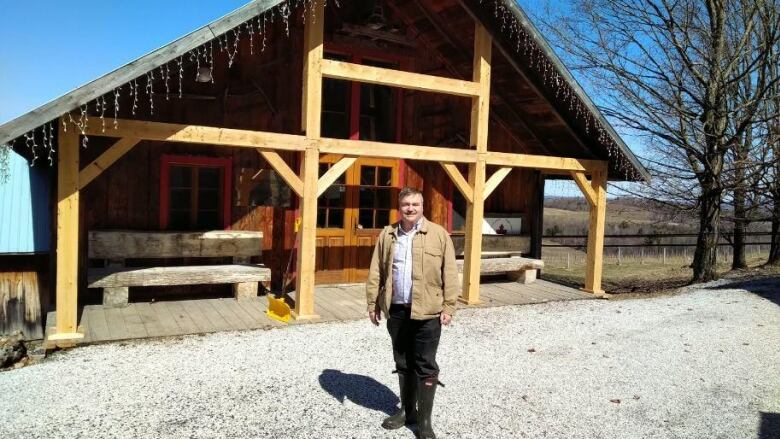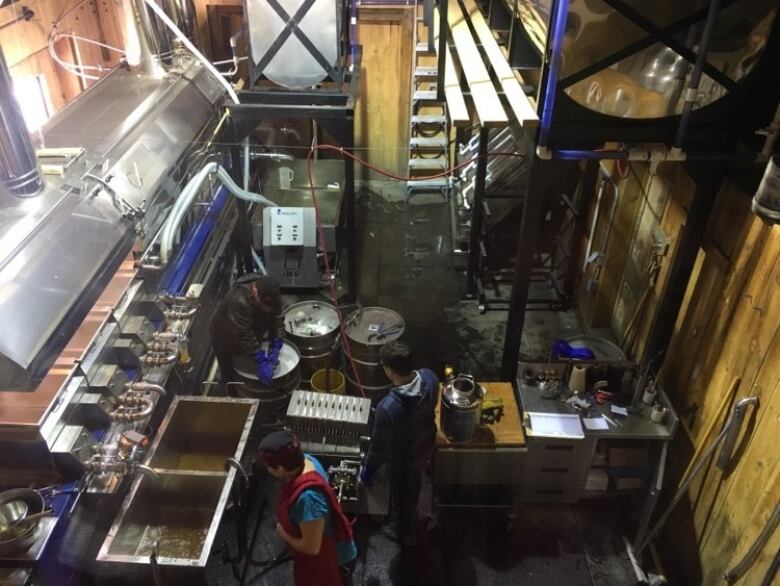Sap is running, but that's no solace to Quebec sugar shacks as they try to weather COVID-19 storm
'Obviously, the trees don't know COVID-19 is around': Maple syrup sugar shack owners face financial ruin

For six straight years, L'rablire Hilltop, a popular sugar shack in Dunham, in the Eastern Townships, had watched its business steadily grow.
Last year, it served 6,000 meals over the eight weekends it was open.
To accommodate more customers, owner James Bond recently did some renovations in the dining room and added 40 more seats.
It seemed like a good investment. In mid-March, two weekends into the season, reservations were up by 30 per cent.
Then, on March 15, the government shut down the province's sugar shacks, along with all other non-essential activities, to limit the spread of COVID-19.
The impact was immediate.
"For us, it's a loss in gross revenues of $250,000," said Bond.
Big financial hit
Bond has a mid-sized sugar-bush operation with about 12,000 taps enough to service his sugar-shack customers and send some maple syrup to Citadelle, Quebec's largest co-operative of maple syrup producers.
Bond kept on five employees to continue producing maple syrup, but he's now relying on a line of credit to cover his operations.
The sugar shack makes up about 40 per cent of Bond's overall business. He also farms corn, soya beans and apples.
"The sugar shack was able to pay the expenses of the farm for March, April, May and June. So that income stream is gone for this year," he said.

There are about 220 sugar shacks in Quebec which have a permit to operate as a restaurant-style business.
Of those, 70 are members of the Quebec Maple Syrup Federation. Theywear two hats, running both a sugar-shack business and producing syrup from their own trees, said the federation's executive director, Simon Trpanier.
"For them, it's very, very difficult," he said.
Not only did these businesses have to lay off staff, but huge quantities of food had to be donated, thrown away or returned to suppliers.
Unlike a restaurant, which is usually open year-round and could turn to takeout to get through the next few months, sugar shacks only operate for six to eight weeks a year.
"It's basically the entire year of income that disappears," said Trpanier.
This month, the federation sent out a survey to these producers to gauge how the shutdown has affected their business. The impact varies, as many smaller producers have owned the land for generations.
However, Trpanier said, most of his members are too busy to answer the survey right now. Maple syrup production is in full swing, and many are taking advantage of the good weather to collect as much sap as they can.
"Obviously, the trees don't know COVID-19 is around," said Trepanier.
Unstable export market
The biggest challenge for the federation's producers will be the market, said Trpanier.
Right now, sales are strong, but about 60 per cent of the maple syrup produced in Quebec is exported to the United States.

With record-high layoffs south of the border, consumers with a limited budget may think twice about buying maple syrup, which is what happened during the 2008 financial crisis.
"The U.S. economy was very bad, and the sales of maple syrup went down," he said.
So far, truckloads of maple syrup are being shipped across the border, but with ever-changing decisions about what is considered essential, there is no guarantee that will continue.
If sales start to slump, Trpanier said, the syrup will need to be stored in the Global Strategic Maple Syrup Reserve, located in Laurierville, Que.
The reserve holds about 80 to 85 per cent of a normal crop and ensures markets have a steady supply, regardless of the harvest in any given year.
"This year, if the sales are slower because of the economic crisis caused by COVID-19, we will stockpile a lot of syrup," said Trepanier.
He said he may ask the province for help if sales drop off dramatically this fall.
Industry shakeup next?
Although Quebec produces about 91 per cent of Canada's maple syrup supply, the COVID-19 crisis may give other players a chance to make inroads, said Jordan LeBel, a professor of food marketing at Concordia's John Molson School of Business.
Quebec's competitors in New Brunswick, Ontario and Vermont are becoming better organized.
In Vermont particularly, a lot of capital is being invested to modernize equipment and develop new products and flavours to appeal to new consumers, said LeBel.

LeBel thinks the United States has also done a better job of educating people that maple syrup isn't just for pancakes on Sunday mornings.
"You can put it on other things. You can cook with it. You can make vinaigrettes with it," he said.
Comparatively speaking, Quebec is in a bit of a rut, said Lebel.
The bulk of maple syrup here is still sold in metal cans. Although some larger producers have tried to branch out and diversify, LeBel describes their efforts as piecemeal and sporadic.
He would not be surprised to see some savvy investors come in and try to buy up some of the smaller producers who have been slower to diversify and may have a tougher time staying afloat.
"I think what we are looking at is a bit of a shakeup of the sector going forward after the short-term financial woes are over," said LeBel.
Uncertain future
Back at L'rablire Hilltop, Bond says he's trying to work out creative solutions with his bank. So far, it has pushed back his interest and principal payments for a few months, but eventually, he will have to make payments.
With no cash sales from the sugar shack, Bond says he's dependent on the money he'll get from the co-operative, which comes in three instalments.
But the first instalment won't arrive until August, and that's a long way off when there are bills to pay, fuel to buy and a payroll to keep, said Bond.
"It's distressing. It creates a lot of stress."













_(720p).jpg)


 OFFICIAL HD MUSIC VIDEO.jpg)
.jpg)



























































































